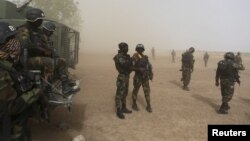Nigeria and its neighbors pledged last year to come together to defeat Boko Haram, but experts say regional cooperation appears to be happening in fits and starts.
Collaboration across borders has long been seen as key to ending the Boko Haram insurgency, which started in Nigeria but has since spread through the country’s porous borders into neighboring Niger, Chad and Cameroon.
Nigerian and Cameroonian military officials say the Multinational Joint Task Force composed of troops from Niger, Nigeria, Cameroon, Chad and Benin is actively fighting Boko Haram and achieving some success.
Boko Haram, however, still carries out attacks in Nigeria and its neighbors, leading some experts to question whether regional cooperation is as deep as it should be.
“We’re really talking about a regional coalition [where] everybody’s on his own and collaborating when there’s a need to and basically when they’re forced to,” said Yan St-Pierre, CEO of the Berlin-based security firm MOSECON.
He said regional rivalries, internal political turmoil and language differences keep the five countries involved from effectively collaborating.
“It works in spurts, and it works in little bursts, but it’s not this consistently working, effective coalition,” St-Pierre said.
The task force has been around for years, but mostly targeted criminals.
In June of last year, Nigeria held a summit with neighboring heads of state and top military officials, agreeing to reinvigorate the force with $100 million in Nigerian funding and a headquarters in the Chadian capital, N’Djamena.
In recent months, Nigeria’s military has announced joint patrols with Cameroon and operations backed by Chadian jets.
Nigerian military spokesman Rabe Abubakar said intelligence from U.S. drones based in Cameroon has been passed on to Nigeria, thanks to the task force.
“For the past three or four weeks we have been doing … operations in concert with other nations within the Lake Chad basin countries,” Abubakar said.
Cameroon military spokesman Didier Badjeck says the troops involved in the force mostly stay within their own borders but conduct joint operations and can cross into other countries to pursue the group.
“If everybody is playing his role in the zone, Boko Haram will finish,” Badjeck said.
Group remains potent
In June, the militants killed 26 soldiers, sacked a town and forced 50,000 people to flee in a series of attacks in Niger, not far from the Nigerian border.
And contrary to the assertions of Nigeria’s government, the group still controls territory in northeast Nigeria. A senior military official told VOA on condition of anonymity that the Mobbar and Abadam local governments, on the border with Niger, are still under Boko Haram control.
The group’s fight to impose strict Islamic law in northern Nigeria has killed more than 20,000 people and forced 2.7 million to flee.
John Campbell, a fellow at the New York-based Council on Foreign Relations and a former American ambassador to Nigeria, said Boko Haram would not be as strong if the multinational task force was collaborating as intended.
“It would be transformative if it led to the destruction of Boko Haram,” Campbell said. “And it has not.”




